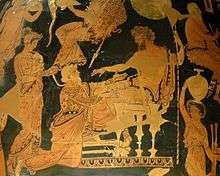Chryses of Troy
In Greek mythology, Chryses (/ˈkraɪsiːz/; Greek, Χρύσης Khrúsēs, meaning "golden") was a Trojan priest of Apollo at Chryse, near the city of Troy.
Family
According to a tradition mentioned by Eustathius of Thessalonica, Chryses and Briseus (father of Briseis) were brothers, sons of a man named Ardys (otherwise unknown).
Mythology
During the Trojan War (prior to the actions described in Homer's Iliad), Agamemnon took Chryses' daughter Chryseis (Astynome) from Moesia as a war prize and when Chryses attempted to ransom her, Agamemnon refused to return her. Chryses prayed to Apollo, and he, in order to defend the honor of his priest, sent a plague sweeping through the Greek armies, and Agamemnon was forced to give Chryseis back in order to end it. The significance of Agamemnon's actions lies not in his kidnapping Chryseis (such abductions were commonplace in ancient Greece), but in his refusal to release her upon her father's request.[1]
References
- Stewart, Michael. "People, Places & Things: Chryses", Greek Mythology: From the Iliad to the Fall of the Last Tyrant. (Chryses) Archived 2012-05-29 at Archive.today
Sources
- Bibliotheca, Hyginus, R. Scott Smith, and Stephen M. Trzaskoma. Apollodorus' Library and Hyginus' Fabulae: two handbooks of Greek mythology. Cambridge: Hackett, 2007.
